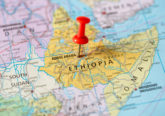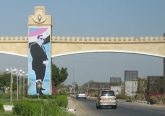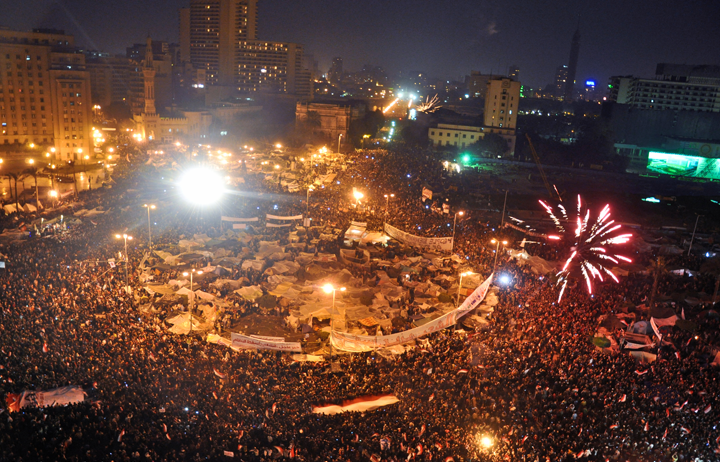
After suffering decades of repression and forced to go underground, the recent election victory for Egypt’s Muslim Brotherhood has emboldened the movement to spread its influence in a region where mainstream political Islam has for so long been denied.
At the same time, this is cause for much anxiety to the remaining despotic Arab regimes, particularly in the oil-rich Gulf.
Even prior to the elections it was widely reported that the Saudi’s preferred an Egypt run by the remnants of Mubarak’s regime, such as Ahmed Shafik, than an Islamist candidate.[1] They fear that a brotherhood victory will not only embolden the already problematic Islamist opposition at home but also set the grounds for Egypt reclaiming leadership of the Islamic world, upstaging the traditional role of Saudi Arabia.
If paranoia about the Brotherhood had a official spokesperson, it was in the form of the outspoken Dubai Police Chief, General Dahi Khalfan. His row with the Brotherhood began in February this year when one of it most influential clerics, Qatar-based Yusuf al-Qaradawi, condemned the UAE’s decision not to renew the residence permits of Syrians who had taken part in anti-Assad demonstrations and also strip citizenship from UAE nationals affiliated with Islamist organisations.
In return, Khalfan lashed out at al-Qaradawi, threatening to arrest him if he ever set foot in Dubai again.
Temperatures rose. The Brotherhoods spokesman, Mahmud Guzlan, responded to his threats by warning that the whole Islamic world would stand against the UAE[2] should he decide to do that. This then devolved into tit-for-tat exchanges from Emirati officials and Brotherhood notables. A statement from the Gulf Cooperation Council (GCC) accused the Brotherhoods spokesman of being irresponsible.[3]
Khalfan then fired more salvos by suggesting that the Brotherhood’s strategic aim was to establish governments in the Gulf that paid allegiance to them. This he claimed was leaked to him by none other than Western intelligence agencies. Then he went further by accusing the Brotherhood’s supporters of using social media to stir up opposition to the Gulf’s ruling elite.[4]
To what extent his anxiety and an eagerness to bend any fact to fit the purpose at hand influenced his rhetorical stance, we don’t know.
President-elect Morsi’s denial about ‘exporting his country’s revolution’, itself in response to Khalfan expressing ‘condolences’ at his victory, are unlikely to ease tensions in the long run.[5]
Gulf rulers are terrified at the prospect of home-grown Islamists using elections to venture their way into political power — and thereby do away with the traditional monarchical power structures.
And Morsi’s recent comments will do nothing to soothe any of the apprehensions that Gulf states have.
His talk of ‘unions’ with Iran[6], done so in order to create a strategic balance in the region, is surely giving them jitters — remembering that Iran is considered a pariah state in the region and is the predominant reason for a massive arms build-up by GCC countries.
The Brotherhood stance on Israel, the Arab world’s long time nemesis, is also a point of contention.
Even before the electoral victory, the Brotherhood made clear that it would never recognise Israel[7], a move which will bolster the position of Islamist movements like Hamas and Hezbollah. It is a conflict which inevitably, although reluctantly, puts pressure on them to support it both politically and financially.
But in my opinion, all these worries may be a bit far fetched.
The Egyptian economy is in dire need of financial assistance, and this development requires its incumbent rulers to be on good terms with the Gulf States, in return for aid and the continued flow of expat remittances.
The combination of the Egyptian military, revolutionary forces, US and international suspicions — all coupled with no functioning parliament, constitution and executive — should go some way to alleviating any immediate premonitions about an emerging Brotherhood-led Islamist block acting as a serious counterweight to the Gulf’s old guard.
Mohammad I. Aslam is a Ph.D candidate in Political Science at the Department of Middle-East & Mediterranean Studies, King’s College London, and a former Editor at the Montreal Review Journal.
________________________________________
[1] http://nvonews.com/2012/06/26/mursis-election-rattles-gulf-sheikhs/; http://www.egyptindependent.com/news/rise-muslim-brotherhood-frays-saudi-egypt-ties;http://english.alarabiya.net/articles/2012/05/05/212328.html
[3] http://m.bbc.co.uk/news/world-middle-east-18582746
[4]file:///C:/Documents%20and%20Settings/sigis1/Desktop/Dubai%20says%20Islamists%20trying%20to%20weaken%20UAE%20via%20Twitter%20%20%20Reuters.htm
[7] http://www.jpost.com/MiddleEast/Article.aspx?id=251732






No Comment